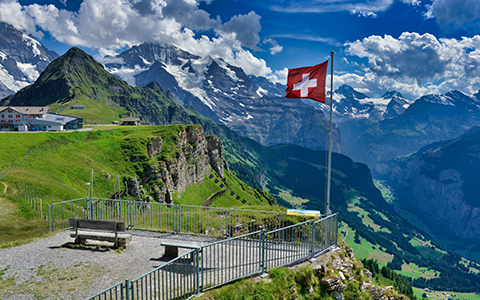
发布时间:2023-03-01
导语:
鲜为人知的是,瑞士已连续12年成为全球创新引领者。这样一个内陆国家,面积不大,是如何变劣势为优势,多年来保持全球创新标杆的位置?瑞士在创新领域又有哪些特色?本文将带您一探究竟。

历史表明,积极创新往往有助于改善生活水平、提高生产力。瑞士在历史上克服了许多劣势,让国土面积小这类因素为其所用,创造收益。
显然,技术创新将是应对气候变化、地球环境治理及人类面临的其他各项挑战的关键。
全球创新指数由世界知识产权组织(WIPO)编制,根据每年申报专利数量、研发投入占GDP百分比、教育体系的稳健性等指标对各国进行排名。瑞士聚焦于金融科技、医药和食品体系等多个领域并投入资源,在以上多项指标方面一直成绩显著。
瑞士在全国各个地区鼓励和支持特定领域的创新,由此形成了多个中心——考虑到地形因素,这些中心被称作“山谷”。瑞士在创新方面还设有政府专门机构“瑞士创新局”(innosuisse),其使命是为科学创新提供资金,而瑞士大学的研究成果往往有助于创建初创企业。

挑战:
乍看之下,瑞士并没有什么优势。它国土面积不大,处于内陆山地,只有870万居民,周围都是更大、更有影响力的国家。然而,这些一般人认为不利的条件却被瑞士利用起来,成为对自己有利的因素。
教育是瑞士成功的根本。瑞士拥有从幼儿到研究生阶段强大的教育系统。按人均计算,瑞士拥有全球最多的500强大学,其中两所联邦理工大学更是排在全球前列:苏黎世联邦理工大学(ETHZ)和洛桑联邦理工大学(EPFL)。
瑞士既进行基础研究,也进行应用研究,既追求知识,也寻求社会和经济问题的解决方案。因此,瑞士的大学和产业之间有着紧密的合作也就不足为奇了。八所瑞士应用科技大学形成的网络将这种合作正式化,在大型机构的基础研究与产业界之间、尤其是中小企业之间起到了桥梁作用。
瑞士的这种活力以及不大的国家规模为其发展各个主题创新区域创造了条件。这些区域包括起源于楚格(Zug)的加密谷协会(Crypto Valley Association),专注于国际区块链的发展;总部位于洛桑和苏黎世两地的无人机谷(Drone Valley),专注于开发应用于太阳能和环保等领域的无人机;以及瑞士食品和营养谷(Swiss Food and Nutrition Valley),致力于食品体系创新。
瑞士在研发方面的支出超过GDP的3%(2019年达255亿美元),其中私营部门的研发支出约占三分之二。它的有利影响体现在瑞士每年注册的专利数量上。按人均计算,瑞士多年来是全球专利注册项目最多的国家;2021年为8,442项,主要集中在医疗技术领域。
如此骄人的创新成绩得益于两个关键词:安全和信任。无论是金融还是政治,瑞士都是一个安全的避风港。低资本成本、稳定的货币、强大的购买力、适度的税收、联邦国家制度以及稳定的经济和政治,保证了在瑞士投资的高度安全性。

方案:
如果您想知道在瑞士如何投资以及在哪里投资最有意义,雷梭勒家族办公室可以为您提供最佳答案。因为信任、审慎和安全也是雷梭勒过去十年来在中瑞两地取得成功的基石。十多年来,我们始终为您提供值得信赖且可靠的顾问服务。
联系方式:
电话:400-006-7726
邮箱:info@lasoleille.com
资料来源:Alois Zwingii,世界经济论坛,2023年1月
Original English Text
Switzerland, a small, landlocked country serves since many years as a global model for innovation
History shows that radical innovation typically contributes to higher living standards and improved productivity. In its history, Switzerland has overcome many of its disadvantages, using factors like its small size to its benefit.
It is obvious that technological innovation will be key to deal with climate change, repairing the planet together with other challenges that humanity faces.
It is less known that since 12 years in succession, Switzerland is the world’s leader in innovation.
The index, compiled by the World Intellectual Property Organisation (WIPO), ranks countries in areas such as the number of patents filed annually, the percentage of GDP that goes into research and development, and the robustness of their education systems. Switzerland has shown unwavering consistency in these areas and beyond, pouring resources and focus into areas as diverse as fintech, pharmaceuticals and food system.
As a result, centres - or rather, given the topography - "valleys" have formed throughout the country where innovation in a particular field is encouraged and supported. Switzerland also has its own agency - Innosuisse - whose mission is to fund science-based innovation, and the work of its universities often contributes to the creation of start-ups.
The challenge:
At first glance, Switzerland does not have many advantages. It is small, mountainous and landlocked, has only 8.7 million inhabitants and is surrounded by larger, influential countries. However, it has used what some would consider a disadvantage in its favour.
Education is fundamental to its success. It has a strong system of learning from early childhood through to post-graduate level. It has the world’s highest density of Top 500 universities in per capita terms, led by global luminaries, the two Swiss Federal Institutes of Technology, ETHZ in Zurich and EPFL in Lausanne.
Both basic and applied research is conducted here, supporting both the pursuit of knowledge and solutions to social and economic problems. Not surprisingly, this leads to intensive collaboration between the country's universities and industry. This is formalised by the network of eight Swiss universities of applied sciences, which acts as a bridge between basic research at the larger institutions and industry, especially SMEs.
This dynamic and the country’s small size has helped develop thematic areas of innovation. Among these are the Crypto Valley Association, which originated in Zug, and focuses on international blockchain development; Drone Valley, with its dual bases in Lausanne and Zurich, and focus on developing drones that have application in areas like solar energy and environmental protection; and the Swiss Food and Nutrition Valley, which strengthens food system innovation.
The country spends more than 3% of GDP on R&D (amounting to $25.5 billion in 2019), with the private sector accounting for approximately two-thirds of this. An indication of the beneficial effects of this are the number of patents that Switzerland registers annually. On a per capita basis, it has registered the most globally for years; 8,442 in 2021, with a focus on medical technology.
The key words for such innovation are security and trust. Switzerland is a safe haven, both financially and politically. Low capital costs, a stable currency, strong purchasing power, moderate taxation, a federal state system, and economic and political stability guarantee a high level of security for investments in Switzerland.
The solution:
If you want to know how and where it makes the most sense to invest in Switzerland, La Soleille Family Office is the best address for your questions. Because trust, discretion and security are also La Soleille's basis for the successful last ten years in China and in Switzerland. We have been providing you with trustworthy and reliable advice for over a decade.
Source: Alois Zwingii, World Economic Forum, January 2023
本文转载自瑞士雷梭勒家族办公室,如有侵权,敬请告知删除。
Sooswiss为您提供
瑞士方向私人管家式的定制服务:
1)家族传承 2)财富管理 3)投资咨询
4)企业服务 5)居留计划 6)国际教育
更多资讯请登录网站 www.sooswiss.com
